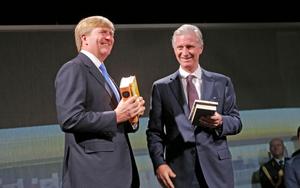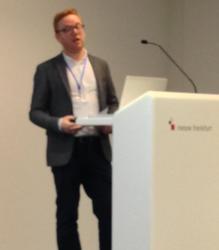 "This strange idea that it's us vs. the Americans hasn't played out," said Gaby Wood, literary director of the Booker Prize Foundation, during a panel discussion at the Frankfurt Book Fair last week about the role of national and international literary prizes in the publishing industry. Wood talked about the opening of the Man Booker Prize to any novel written in English and published in the U.K., regardless of the country of origin, and the fear expressed by many people at the time of the announcement that this would allow American writers like Jonathan Franzen or Donna Tartt to win year after year. Franzen and Tartt, Wood said, have not been shortlisted in years they were eligible, and she asserted that the Booker should be viewed as more of an international than national prize.
"This strange idea that it's us vs. the Americans hasn't played out," said Gaby Wood, literary director of the Booker Prize Foundation, during a panel discussion at the Frankfurt Book Fair last week about the role of national and international literary prizes in the publishing industry. Wood talked about the opening of the Man Booker Prize to any novel written in English and published in the U.K., regardless of the country of origin, and the fear expressed by many people at the time of the announcement that this would allow American writers like Jonathan Franzen or Donna Tartt to win year after year. Franzen and Tartt, Wood said, have not been shortlisted in years they were eligible, and she asserted that the Booker should be viewed as more of an international than national prize.
Wood noted that there were only two Americans on the shortlist this year (Otessa Moshfegh and Paul Beatty, who won the award), and they give, if anything, "evidence to the diversity of publishing." She added: "What readers get in the U.K. is books from all over the world. It is a much better reflection of how people read."
---

|
|
| photo: Frankfurt Book Fair | |
During a meeting of the European and International Booksellers Federation at Frankfurt last Thursday, Jan Orthey, owner of Luenebuch, Buchhandlung am Markt in Lueneburg, Germany, discussed the creation of a pilot project providing a free, same-day delivery option to his customers. Through an agreement Orthey has with the local postal service, if a customer orders an in-stock book any time before 4 p.m., it will be delivered to the customer's home between 7 and 9 p.m. Orthey said that he would like to extend this program to other Lueneburg retailers and create the slogan "Lueneburg delivers," and added that retailers should "make sure the customer has VIP status with us that they don't have elsewhere."
When asked about the profitability of the program, Orthey acknowledged that its real purpose was marketing. "The big online shops do free shipping, so we don't have the chance to say we take money for this," said Orthey. "We do same-day delivery as marketing. We can't earn money by sending a single book by car at night to the customer. But it works quite well for us, for marketing."
In Lueneburg, Orthey has also been instrumental in creating a Buy Local association of city retailers that has very strict acceptance criteria and is marked by a seal of quality. "By giving a quality promise reflected by this seal, this logo, customers can rely on this," explained Orthey. "Customers can expect first-class retail. The expectation should be much higher than the average of what other retailers offer."
---
According to Alex Schade, commercial manager of the Nederlandse Boekenbon (the Dutch Book Token), booksellers in the Netherlands will soon have an app called Readr. Through it, booksellers will be able to sell books directly to their customers, start loyalty and communication programs, share event schedules and create their own book-related content. The app will have a soft launch on October 31 before going live in early 2017. Eventually, the app will allow users to do price comparisons (even though the Netherlands has fixed book prices), see the actual stock in bookstores, and be able to gift books and create wishlists. Schade said that for booksellers to sign up, there is a one-time fee of €100 (about $109) and a monthly charge of €75 ($82).
---

|
|
| Opening of the Dutch-Flemish Pavilion with (l.) King Willem-Alexander of the Netherlands and King Philippe of Belgium (photo: Alexander Heimann/Frankfurt Book Fair) | |
At the 38th annual International Supply Chain Seminar at Frankfurt, organizer EDItEUR celebrated its 25th anniversary. The group has been celebrating a string of anniversaries: last year, it marked the 50th anniversary of standard numbering. Next on the agenda possibly: the 10th anniversary in 2017 of the introduction of the 13-digit ISBN.
---
International Supply Chain Seminar keynote speaker Ruth Jones, director of business development at Ingram in the U.K., spoke about technology and competition, saying that the book industry has "to perform in the marketplace" and has done very well. "I haven't worked with a more engaged or networked group of people in last five years."
She noted that one of the biggest changes in retail is the "empowerment of consumers," the creation of a "me economy," adding, "I expect a lot as a consumer. I expect the thing I want and choice in the thing I want.... I'm very particular about what I'm looking for." And once she's found the thing she wants or wants what's been suggested, her expectation is that "I can make that purchase seamlessly. That's the crux of the issue."
The "me economy" and "the rise of personalization" have led to an explosion of print-on-demand and personalized books. "People pay more money for those books than if they were just generic cookbooks or love poetry books," she added.
Jones suggested that the book supply chain could be like a "wildflower meadow," different from a garden, where "no one is governing it," and different flowers, grass, and wheat can take over. "I think that's what people looking for," she said. "They're looking for the unusual. They know where the vanilla books are. They want a place to buy books and the other things they want."
---
 |
|
| David Walter | |
David Walter of Nielsen Book discussed the company's new surveys of metadata usage, an update on its 2012 survey, which used a variety of methods to find that--while not considering other factors--a correlation between higher sales and "the best and fullest metadata." The strongest correlation is in fiction.
Walter said that one of the most important bits of metadata is a cover image, which is particularly important, Walter said, for children's books and fiction. Besides basic metadata, including title and author information, pub date, format, ISBN, prices and subject category, descriptive metadata such as an author biography and reviews helps, too. Keywords such as character names, locations, associated organizations, broader terms, addition information on themes, related titles or authors is also helpful.
The key purpose of enhanced metadata, Walter stressed, is "to maximize discoverability when people are searching for titles."
---
Also at the International Supply Chain Seminar, Ronald Schild, the head of MVB, the Börsenverein company that is responsible for the German version of Books in Print, buchhandel.de, Börsenblatt magazine and other products and services, discussed how MVB is helping introduce electronic data interchange and other improvements to Brazil's book industry, which lacks the infrastructure common in Western book markets. After his comparison of German and Brazilian book industry statistics, Carlo Carrenho of Brazil's PublishNews, commented, "That's the best explanation of why Germany beat Brazil 7-1 [in the 2014 World Cup semifinal]." The crowd roared. --Alex Mutter and John Mutter

